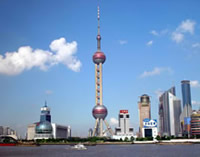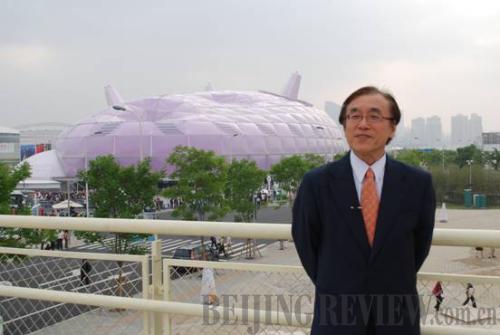|
|


ADVERTISEMENT
Buy Your own advertising
spaces!
.
Download Adobe Acrobat Reader to open [PDF] files.
Recent Visitors
More Than Sightseeing
2010. 5 July
 Noriyoshi Ehara, Director of the Japan Pavilion
Noriyoshi Ehara, Director of the Japan Pavilion
(bjreview.com.cn)
The World Expo in Shanghai is being held just two years after China hosted the 2008 Olympic Games in Beijing. Japan had a similar experience about 40 years ago. After Tokyo hosted the Olympic Games in 1964, another Japanese city, Osaka, hosted the World Expo. Back then, Japan's economy was growing quickly and the Expo became a stimulus for Japan's economic boom. What will the Shanghai Expo bring to the Chinese economy? Beijing Review reporter Miao Xiaoyang recently asked Noriyoshi Ehara, Director of the Japan Pavilion and international trade promoter.
Beijing Review: Media organizations have said that China is in a similar state as Japan when it hosted the 1970 World Expo in Osaka. Do you agree with them?
Noriyoshi Ehara: When hosting the Osaka World Expo, Japan was experiencing fast economic growth, which was similar to what China is experiencing now. By implementing economic development-oriented policies, China has been able to accumulate considerable material wealth, but the development has also generated some social problems. Undoubtedly, China will surpass Japan in 2010 to become the world's second largest economy. Meanwhile, China's development has given rise to problems such as environmental degradation and overpopulated cities. This path also echoes Japan's history.
However, China is engaged in transforming its development mode and conducting economic restructuring, which I believe signifies a major policy change. From the perspective of a person's daily life, this change means concepts of environmental protection and energy conservation should be put into practice. Many pavilions at the Expo adopted environmental protection as their theme. I believe that creating an economic structure and transforming daily life based on energy conservation and environmental protection will significantly prevent economic bubbles from forming.
I believe the Shanghai World Expo reflects China's achievements in economic development. As the world becomes more interested in China, there will be a steady increase in foreign tourists to the country. In the medium and long run, China will further expand its technological and economic exchanges with other countries.
What is your interpretation of the "Better City, Better Life" theme of the Expo?
Economic growth will enable people to realize the dream of "Better City, Better Life," but economic growth alone cannot guarantee "a better life." I think the exhibitions of the China Pavilion and other national pavilions have illustrated to the world the connotations of the "Better Life" theme advocated by the Shanghai Expo. I think the deeper meaning of this theme is to highlight the goal of economic development lies in protecting the environment of our planet. This is a topic of great significance.
As China is going through rapid urbanization, the "Better City, Better City" theme resonates with the country's future.
At this Expo, the Japan Pavilion has built a futuristic "zero-emission town," a municipality set in 2020 that emits no carbon dioxide at all, as a practical example of a "Better City." We also display a "Life Wall," which gives a glimpse of what a living room in the future will look like. In such a room, the wall doubles as a TV, which people can control remotely by making gestures. We also exhibit robots that can help with housekeeping and play the violin. These are all instructive elements for building a "Better Life" in the future.
What are your expectations for the Chinese economy after the Expo?
I expect the Expo to boost the international community's understanding of China. The Osaka Expo increased the world's understanding of Japan. The globalization of the Chinese economy, especially the "going global" strategy of Chinese companies, is advancing rapidly. It would be difficult for the Chinese economy to achieve true globalization if the international community doesn't gain more knowledge of China.
As the largest Expo in history, the Shanghai World Expo has attracted a large number of tourists from various countries, who will go sightseeing around China as well as at the Expo site. Meanwhile, media organizations all over the world are reporting on events taking place in China. I believe this will help the international community know China better. The Expo is as much an opportunity for the world to increase its understanding of China and the Chinese people through intensive reports on Shanghai over six months as it is an opportunity for China to show its economic development achievements to the world.
Source: www.bjreview.com.cn


